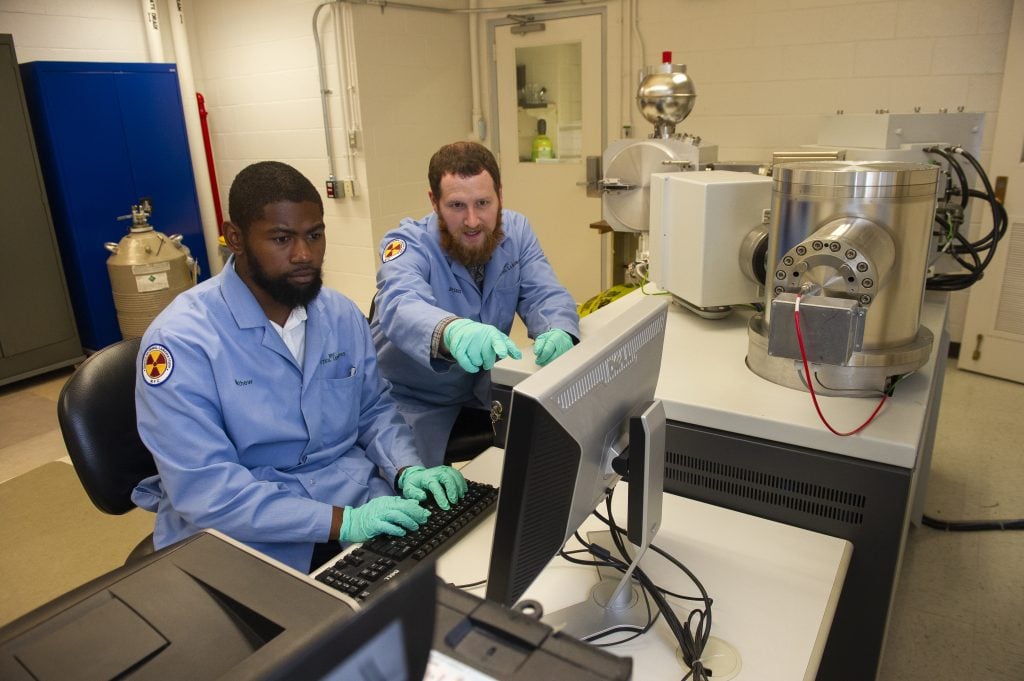Research Excellence Programs
Students, Postdocs, and Faculty
Through nuclear energy research, development and deployment, our national security mission and integrating reliable energy options, Idaho National Laboratory staff promotes eco-friendly environment and secure solutions.
But our workforce is aging. Thirty percent of the lab’s employees are approaching retirement. At the same time, the lab is growing. Forecasts show our business volume increasing annually over the next decade and a half, from $918 million in 2015 to an estimated $1.8 billion in 2030.
It’s never been more important, therefore, to feed the talent pipeline in order to meet the lab’s short-and-long-term workforce needs. That involves more than just an education in nuclear or mechanical engineering. The lab and other employers need folks with a range of “soft” skills: the ability to manage projects; verbal and written communication skills; organizational skills; and computer and technological literacy.
Workforce investments
INL feeds the talent pipeline by investing in education and research partnerships with institutions within our region and throughout the nation. INL plays host to academic visitors, international researchers, graduate students, postgraduate associates, interns and university partners. INL provides students, teachers and professors hands-on laboratory experience and the opportunity to work with world-class personnel.
INL has forged strong relationships with colleges and universities throughout the world and actively encourages its scientists and engineers to collaborate with their university peers on a variety of projects. Doing this fosters an entrepreneurial spirit and promotes creativity.

In 2024, INL student, postdoc and faculty programs have hosted almost 1,000 people from institutions all over the U.S. and throughout the world.
VISITING RESEARCHERS
Growing the talent pipeline means promoting an interactive culture, fostering creativity and enhancing research collaboration between INL and outside researchers, including international colleagues, who participate in educational and cultural exchanges at the lab and return home to share their experiences.
INTERNSHIPS
Attracting talents involves paying high school students, undergrads and graduate students to work on specific projects and apply science, technology, engineering and mathematics (STEM) education concepts in a real-world setting. An INL internship builds confidence, introduces students to possible career fields and complements what they are studying in school.
JOINT APPOINTMENTS
Relationship with stakeholders requires collaboration with leading minds outside the lab. INL and university scientists develop and conduct research at both the lab and universities, contributing to the missions of both institutions.
SUPER
The Strategic Understanding for Premier Education and Research, or SUPER agreement, allows the lab and universities to explore deeper research collaborations and expand opportunities for students, faculty members and researchers.
RESEARCH EXCELLENCE PROGRAMS
Engaging in collaborative research that strengthens the portfolios of INL and the partner universities to further the nation’s strategic nuclear energy objectives.
POSTDOCTORAL RESEARCH
Growing the talent pipeline means providing a mentored research experience and hands-on laboratory experience to individuals with a qualifying doctorate degree. Using the lab setting to deepen postdoc expertise helps ensure the continuity of the INL workforce and spreads the lab’s science and technology influence.
UNIVERSITY WORKFORCE DEVELOPMENT PIPELINE
Nurturing the next generations of experts means helping create an environment in which technology can be brought to market by meeting industry needs and making sure the future tech workers are prepared to replace the aging energy workforce. We do this in a variety of ways, including support for economic development agencies, technical colleges, universities and graduate programs.
HOW DO WE MEASURE SUCCESS?
Obviously, if INL trains and then hires an early career employee who contributes to our daily mission of meeting the nation’s significant energy and security challenges, that’s success. But it’s also a success if one of those early career people who intern, or do their postdoctoral research at the lab venture out and make the world a better place. If they apply the knowledge gained here to their home institution, extend the lab’s influence, promote STEM literacy and contribute to making our world cleaner, safer and more prosperous.
Because that’s what we’re all about.
